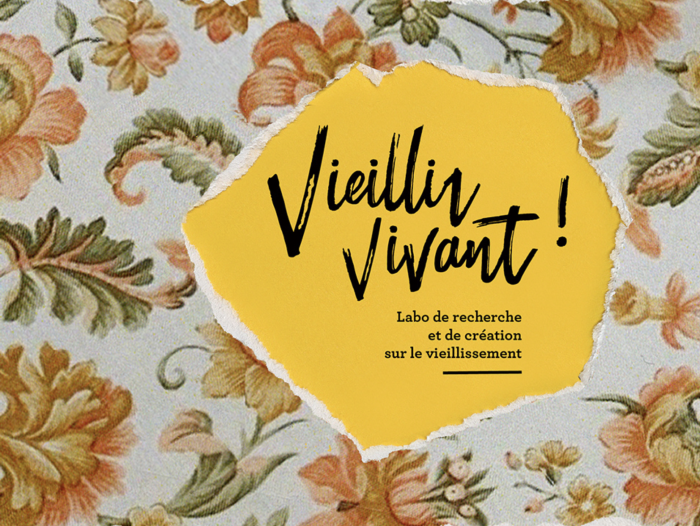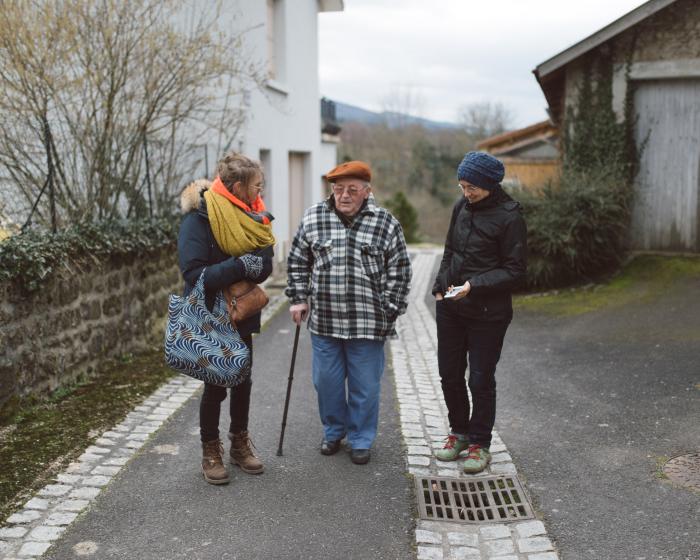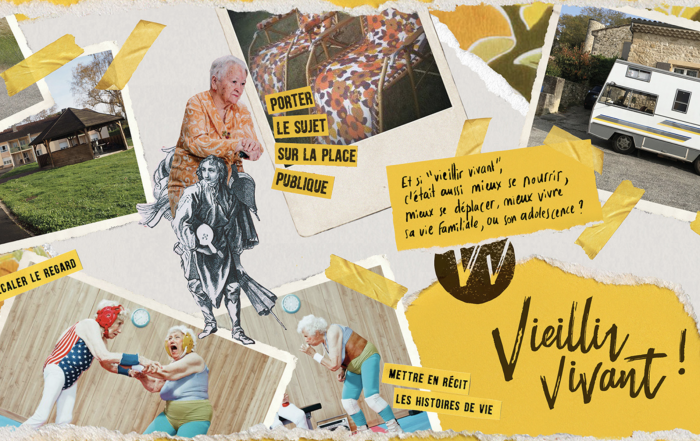I. SUMMARY INFORMATION
Project
268521
Status
Submitted
Award category
Mobilisation of culture, arts and communities
You want to submit
NEW EUROPEAN BAUHAUS AWARDS : existing completed examples
Project title
Vieillir Vivant [ENG : Old and alive]
Full project title
A creative intergenerational lab
Description
Vieillir Vivant is a social innovation programme dedicated to ageing. It gathers a collective of 20 artists, designers, sociologists and architects, plus a broad network of care workers, publics agents, elected representatives and citizens. The programme nowadays runs action-research residencies in 6 territories in France, to compare different contexts for ageing, highlight local challenges, and leverage on national decision making. Vieillir Vivant is driven by the non profit org. Carton Plein.
Where was your project implemented in the EU?
France
6 territories : the rural counties of Livradois Forez (Massif Central), Val de Drôme and Lot, the cities of Paris and Tours and Annecy.
38 rue de Goye
Ambert
63600
When was your project implemented?
Has your project benefited from EU programmes or funds?
No
Which programme(s) or fund(s)? Provide the name of the programme(s)/fund(s), the strand/action line as relevant and the year.
II. DESCRIPTION OF THE PROJECT
Please provide a summary of your project
Vieillir Vivant is an action-research programme initiated by a collective of artists, designers and sociologists, based in 6 very different territories in France (from a remote rural area in the Massif Central to districts in Paris or Tours), and motivated by one idea : after covid19 crisis, we need to enhance public debate about how we (collectively) deal with ageing. Arts, design and social sciences can address this social issue from a cultural perspective and therefore leverage on policy making and health care system. « Vieillir Vivant » aims at creating this space, and promote social innovation processes, specifically in deprived areas.
Our main objectives are :
- To reconsider ageing as a resource rather than a burden, and make it a powerful asset in the development of territories.
- To create inspirational conversations between « experts » of ageing in very different contexts (care workers, elected representatives, public agents families and elders themselves)
- To understand how covid19 crises has transformed our vision of ageing : what we don’t want to be « normal » anymore but also how we adapted, and what we invented to maintain solidarity and strong social bounds during the crise.
- To experiment innovative projects based on people’s ideas and contributions, using co-design methods and participatory investigation.
Please give information about the key objectives of your project in terms of sustainability and how these have been met
We strongly believe that the way we address the general ageing process of the population in western countries is not sustainable : it relies either on technological, expensive and anti-ecological supplies, either on under-paid vulnerable workers including a huge number of women with a migrant background.
Our objective is to demonstrate that better integrating old people in social, cultural and economic life can be an asset for the development of certain territories. As an example, in the rural area of Ambert in Région Auvergne, enabling old people to live in their own homes the city center is a key ingredient to maintain small local businesses, and avoid the town to deteriorate. In socially deprived neighbourhood of Paris, the presence of old persons in publics spaces can pacify relationships between generations, and help inventing inclusive social roles.
Please give information about the key objectives of your project in terms of aesthetics and quality of experience beyond functionality and how these have been met
We thing that our negative vision of aging has led us to forget how to live close to the elder generation. Covid19 crisis has showed how old people were affected by the way they were described as weak, vulnerable and unable to make right choices by the general opinion. In terms of aesthetics, we want to contribute to creating another collective imaginary of ageing, inspiring proudness, humor, tenderness and joy.
In 2020, our work with the franco-norvegian story teller Abbi Patrix (La compagnie du cercle) has enabled the network to go through stories inspired by our field work, and understand how individual stories resonate with collective imaginary, in order and to identify new narratives. Moreover, our network is composed of various artistic skills, including design, marionette theatre, architecture, film making, radiophonic documentary making, and writing. Our residencies in 6 territories in France has enabled us to create, with care workers, families and elders them selves, a new esthetics of aging. From 2020 to 2023, we aim at exploring these esthetics through a mobile exhibition (showed for the first time in Tour in Polau - Pole des Arts Urbains- in 2021), visual documentation and an online media.
Please give information about the key objectives of your project in terms of inclusion and how these have been met
From the economic and public policy perspective, aging is treated in a « silo », a seperated field of society. On the contrary, we think that old age is linked with other social issues, such as the economic development of territories, the transmission of lands, skills and local infrastructure, the maintenance of strong links with landscape and natural environment, etc. « Vieillir Vivant » defines the process of « growing old » as part of everyone’s trajectory, from the very beginning. It aims a starting a discussion about what does it means to have « a good life, in a specific context » rather that focusing on the the only needs and constraints of old age. In that sense Vieillir Vivant aims at concerning people of all ages and from all categories of the population - retired persons but also care workers and elders who contributed to their wellbeing.
Please give information on the results/impacts achieved by your project in relation to the category you apply for
Vieillir Vivant as started as a vision, shared by a small group of professionals. In a few months, we have been able to create partnerships with 6 local governments of different scales (from rural territories like Livradois Forez or Drome to metropoles like Tour, Annecy or Paris). Our network enable very different people to participate to an horizontal creative conversation - for instance a nurse in a remote part of Auvergne, and a congressman in charge of future laws regarding aging. For us this framework, letting each one to speak from one’s experience, is a strong source of empowerment. We also believe that our 6 field work residencies are stimulating change at a local level, by influencing health organizations and local governments, as well a by launching innovative projects. As an exemple, in Paris, Vieillir Vivant is currently experimenting a new local service (called « sustainable mobile grocer ») with a social landlord in a working class district. To finish, Vieillir Vivant aims at becoming more and more a national conversation, to connect people and institution around the subjetc of ageing.
Please explain the way citizens benefiting from or affected by the project and civil society have been involved in the project and what has been the impact of this involvement on the project
Implanted in 6 areas in France, our collective has developed strong links with local communities : we don’t see our action as an external consultancy rather than a long term field learning process, including a critical feedback on our own practice (as artists, sociologists, designers, architects, care workers …). Therefore we rely a lot on participatory investigation methods, co-creation processes, and transparent documentation, to involve citizens in each project. We orgnanize a monthly webinar dedicated to key subjects of aging (intergenerational housing, for example) which are choosen with the citizens and experts of the field. We are frequently contacted by habitants (elders and/or families) to share our observations and create new contacts.
Please highlight the innovative character of the project
In a context of crisis, when medias an politics focus on technical issues of our health care system, addressing ageing from a cultural and artistic perspective is for us a way to take a step back, find inspiration, and be more innovative, ta face future crisis. One of our main objectives is to promote elder’s will to participate to civic and social life : we are convinced that a huge potential of innovation resides in our ability to listen and be more open to old people’s contributions. Vieillir Vivant aims at creating tools (through artistic work and social investigation) to innovate "with" (and not "for") the people directly concerned by the issues of ageing : old persons but also care and social workers, family helpers, etc.
Please explain how the project led to results or learnings which could be transferred to other interested parties
Vieillir Vivant demonstrate the value of grass-rooted community based work, impulsing social change, by working in the field with artistic and co-creation methods, and gathering an inspiring network of people and skills. We believe that this process can be an entry point in other sensitive or « taboo » issues of the society such as social inequality, migration crisis (particularly strong in big cities of France) and pauperization of rural countries. As a transversal subject, Vieillir Vivant aims at breaking the silos of traditional policy making and create a parallel creative space for reinventing our social organizations, directly with citizens.
Is an evaluation report or any relevant independent evaluation source available?
No
III. UPLOAD PICTURES
IV. VALIDATION
By ticking this box, you declare that all the information provided in this form is factually correct, that the proposed project has not been proposed for the Awards more than once under the same category and that it has not been subject to any type of investigation, which could lead to a financial correction because of irregularities or fraud.
Yes


